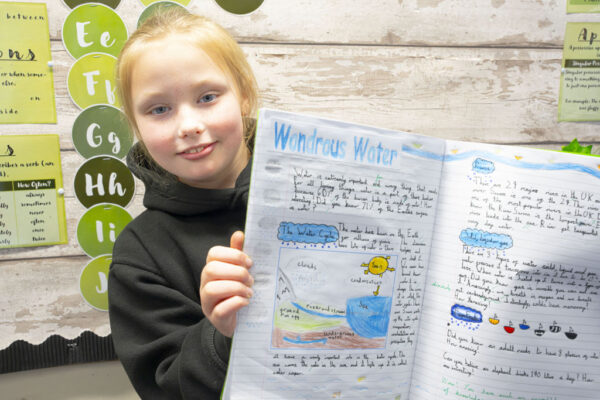
Intention
At Randlay Primary School, we want to ignite a sense of curiosity in our children, encouraging them to explore, question and understand the world around them. Our Science curriculum is designed to foster inquiry-based learning, where children develop the skills and knowledge needed to explore the natural world and become critical thinkers. We aim to nurture a lifelong love of science, ensuring that our pupils are equipped with the tools to make sense of their environment, understand the fundamental principles that shape it and appreciate the impact of science on our everyday lives.
We follow the White Rose Science scheme of work, adapted to meet the specific needs of our two-year rolling programme and 1.5 form entry setting. This approach ensures that our curriculum is relevant and in line with the National Curriculum along with being progressive and caters to the diverse learning needs of all our pupils. Our science topics are revisited and built upon as children progress through Key Stage One and Key Stage Two, providing opportunities for deepening understanding and reinforcing prior knowledge. We believe in the importance of revisiting topics, such as ‘Plants’ or ‘Forces’, throughout the primary years, enabling children to consolidate their learning and develop a strong scientific foundation.
Our Science curriculum encourages children to ask questions, develop hypotheses and investigate the world around them. We are committed to developing scientific enquiry skills in every topic we cover, ensuring that our pupils become confident in conducting experiments, observing, measuring, predicting and interpreting results. We aim to foster a mindset of curiosity and resilience, where children are encouraged to think critically, solve problems and persevere through challenges.
Science at Randlay Primary School is taught as a distinct subject but where possible, we make meaningful links to other areas of the curriculum. This ensures that our pupils can apply their scientific understanding across different subjects and see the relevance of science in everyday life.
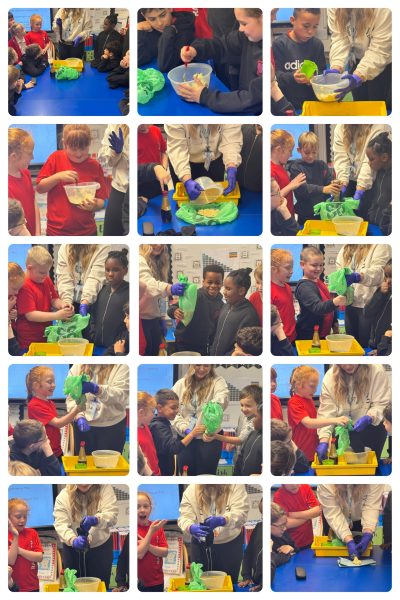
Our rich, hands-on curriculum aims to provide:
- Structured Progression: Builds scientific knowledge and skills progressively across primary school years.
- Development of Scientific Enquiry Skills: Encourages skills such as observing, measuring, predicting, hypothesising, experimenting, interpreting, explaining and evaluating.
- Encouragement of Curiosity: Stimulates children’s natural curiosity and promotes independent thinking and questioning.
- Hands-On Learning: Emphasises practical, hands-on activities to make science more engaging and relevant.
- Key Scientific Concepts: Covers important concepts in biology, chemistry, physics and earth sciences, with progression and revisiting of topics across Key Stages.
- Real-World Application: Connects science learning to real-life scenarios and the world around them.
- Critical Thinking and Problem-Solving: Develops children’s ability to approach problems systematically and work through solutions.
- Promotes Collaborative Learning: Encourages teamwork, communication, and sharing of findings in investigations.
- Digital Literacy: Integrates computing and technology to support investigations and data recording.
Through our Science curriculum, we strive to develop well-rounded, curious and confident learners who understand the importance of science in shaping the future.
Implementation
At Randlay Primary School, we are committed to providing a dynamic and engaging science education that fosters curiosity, critical thinking, and practical skills. We follow the White Rose Science Scheme of work, which is designed to help children develop essential scientific knowledge and skills through hands-on tasks, regular practice, and engaging discussions. Our project-based approach allows pupils to explore scientific concepts in-depth, developing problem-solving and investigative skills. Pupils are encouraged to ask their own questions, engage in practical experiments, and discover answers through enquiry-based learning.
The White Rose approach ensures that lessons are structured to build both substantive knowledge (core scientific concepts) and disciplinary knowledge (scientific methods and processes). Teachers receive regular updates and communication (see appendix 15.5 for examples) to ensure they have the skills and resources to nurture curiosity, execute purposeful practical activities, and effectively teach scientific concepts. This allows us

to foster an environment where pupils can explore science in an interactive, meaningful way, supported by both engaging resources and expert guidance.
Beyond the classroom, we offer extracurricular activities, trips, and workshops that allow pupils to apply their knowledge in different contexts, helping them to make connections between scientific concepts and the world around them. We also foster cross-curricular links with subjects such as mathematics, design technology, and English, enriching pupils’ learning and reinforcing key skills. Events like Science Week provide further opportunities for pupils to explore science in creative and exciting ways.
Ultimately, we believe that all pupils can achieve high standards in science. By following the White Rose scheme, we ensure that pupils receive a carefully structured, consistent hands-on science education that builds knowledge progressively while fostering a love of learning. Through differentiated tasks and opportunities for collaboration, we support all pupils in reaching their full potential and inspire them to continue exploring the world with curiosity and confidence.
EYFS
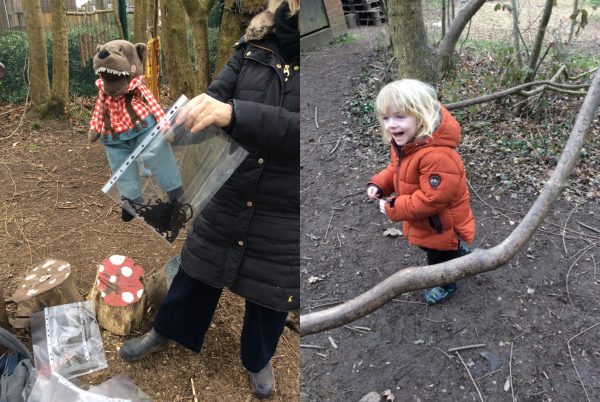
At Randlay Primary School, our Early Years Foundation Stage (EYFS) curriculum is designed to foster a deep exploration of ‘the natural world’, allowing children to connect with and understand their environment in meaningful ways. Drawing upon the guidance set out in Birth to 5 Matters and Development Matters, we have created a carefully sequenced cycle curriculum that nurtures curiosity, observation, and inquiry. This curriculum framework ensures that the foundations laid in EYFS are not only aligned with best practices but also provide a solid base for the learning that takes place in Year 1 and beyond. Each block of learning within the EYFS is thoughtfully crafted to build progressively, ensuring that children develop essential skills and knowledge in preparation for their future educational journey.
In our Nursery at Randlay Primary School, we introduce children to Science through the natural world and hands-on exploration (see appendix 15.6). In Nursery 1, children engage with natural materials, observe their surroundings, and begin to understand basic concepts like family, materials, and the environment. They explore water, investigate everyday objects, and develop early scientific skills through activities such as operating wind-up toys and noticing changes in weather. In Nursery 2, children build on this by learning about the seasons, the life cycles of plants and animals, and simple scientific concepts like magnetism, forces, and material changes. They also gain an awareness of caring for the environment, including recycling, and start identifying animals from different habitats. Through these activities, children develop a sense of curiosity and foundational knowledge that supports their future scientific learning.
Science in our Reception Early Years Foundation Stage (EYFS) focuses on helping children develop a deep understanding of the natural world through the Understanding the World area of learning (see appendix 15.7). In Cycle A, children explore seasonal changes, such as the effects of Autumn, Winter, Spring, and Summer on their environment, as well as basic concepts like plant growth, life cycles, and the characteristics of materials. They engage in hands-on activities like visiting the park to study the woodland, or caring for plants, which helps them connect with nature in meaningful ways. They also learn about forces, light, sound, magnetism, and the properties of materials, alongside practical activities like exploring floating and sinking, and observing reflections. In Cycle B, the focus broadens to include human health and body awareness, alongside further exploration of seasonal changes and environmental issues, such as recycling and ocean conservation. Key activities include learning about minibeasts, electricity, and the impact of different environments on animal life. Through this approach, children build foundational scientific knowledge and skills, preparing them for deeper exploration in later years.
At Randlay Primary School, much of the EYFS Understanding the World curriculum is explored through our “Little Explorers” sessions, which are held during allocated Forest School time. These sessions offer children the opportunity to engage with the natural world in a hands-on, immersive way, fostering curiosity and a deeper connection with their environment. Through Little Explorers, children take part in outdoor activities that promote observation, discovery, and learning about the seasons, plants, animals, and natural materials. The Forest School setting encourages children to explore, question, and learn through play, while also developing their understanding of key concepts such as growth, change, and the natural world around them. This approach not only supports their scientific knowledge but also enhances their physical, social, and emotional development, providing a well-rounded foundation for learning in EYFS.
In the Early Years Foundation Stage (EYFS), assessment is primarily carried out through observations and the Early Learning Goals (EGL). Teachers observe children’s interactions, play, and engagement with the learning environment to assess their development and progress. These observations provide valuable insights into children’s individual strengths, interests and areas for growth.
The Reception Natural World Early Learning Goal (ELG) (see appendix 15.8) outlines specific expectations for children’s understanding of the environment by the end of Reception. Children at the expected level of development will be able to explore the natural world around them, making observations and drawing pictures of animals and plants. They will also demonstrate an understanding of similarities and differences between their environment and contrasting settings, drawing on both their experiences and what has been taught in class. Additionally, they will show an awareness of important processes and changes in the natural world, including the seasons and the changing states of matter. These observations, aligned with the ELGs, help us track each child’s progress and ensure that they are meeting key developmental milestones.
Key Stage One
At Randlay Primary School, our learning in Key Stage 1 (KS1) is carefully guided by the National Curriculum, ensuring that all children receive a broad and balanced education. To support this, we use the White Rose Scheme, which is fully aligned with the National Curriculum and provides a structured framework for teaching the necessary objectives. This approach ensures a cohesive and progressive learning experience that builds essential skills and knowledge, preparing our pupils for the next stages of their educational journey.
National Curriculum Guidance:
The principal focus of science teaching in key stage 1 is to enable pupils to experience and observe phenomena, looking more closely at the natural and humanly constructed world around them. They should be encouraged to be curious and ask questions about what they notice. They should be helped to develop their understanding of scientific ideas by using different types of scientific enquiry to answer their own questions, including observing changes over a period of time, noticing patterns, grouping and classifying things, carrying out simple comparative tests, and finding things out using secondary sources of information. They should begin to use simple scientific language to talk about what they have found out and communicate their ideas to a range of audiences in a variety of ways. Most of the learning about science should be done through the use of first-hand practical experiences, but there should also be some use of appropriate secondary sources, such as books, photographs and videos.
‘Working scientifically’ is described separately in the programme of study but must always be taught through and clearly related to the teaching of substantive science content in the programme of study. Throughout the notes and guidance, examples show how scientific methods and skills might be linked to specific elements of the content.
Pupils should read and spell scientific vocabulary at a level consistent with their increasing word-reading and spelling knowledge at key stage 1.
Key Stage Two
At Randlay Primary School, our learning in Key Stage 2 (KS2) is guided by the National Curriculum for Science, ensuring a comprehensive and rigorous approach to scientific exploration and discovery. In addition, we follow the White Rose Scheme for Science, which is fully aligned with the National Curriculum objectives and provides a structured and progressive framework for teaching key concepts. This combined approach ensures that our KS2 pupils receive a well-rounded education, building essential knowledge and skills to prepare them for future academic challenges.
National Curriculum Guidance:
Lower key stage 2 – years 3 and 4
The principal focus of science teaching in lower key stage 2 is to enable pupils to broaden their scientific view of the world around them. They should do this through exploring, talking about, testing and developing ideas about everyday phenomena and the relationships between living things and familiar environments, and by beginning to de
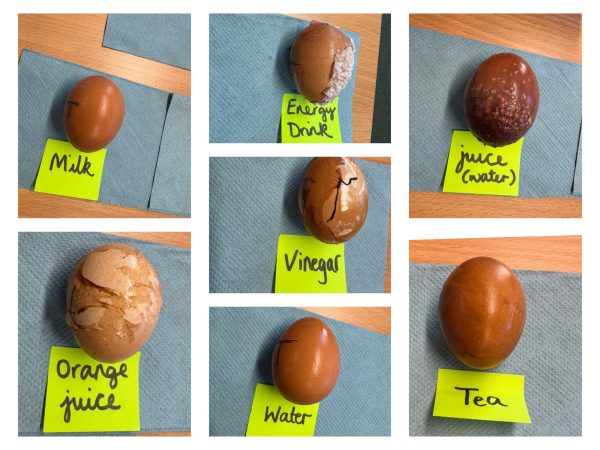
velop their ideas about functions, relationships and interactions. They should ask their own questions about what they observe and make some decisions about which types of scientific enquiry are likely to be the best ways of answering them, including observing changes over time, noticing patterns, grouping and
classifying things, carrying out simple comparative and fair tests and finding things out using secondary sources of information. They should draw simple conclusions and use some scientific language, first, to talk about and, later, to write about what they have found out.
‘Working scientifically’ is described separately at the beginning of the programme of study, but must always be taught through and clearly related to substantive science content in the programme of study. Throughout the notes and guidance, examples show how scientific methods and skills might be linked to specific elements of the content.
Pupils should read and spell scientific vocabulary correctly and with confidence, using their growing word-reading and spelling knowledge.
Upper key stage 2 – years 5 and 6
The principal focus of science teaching in upper key stage 2 is to enable pupils to develop a deeper understanding of a wide range of scientific ideas. They should do this through exploring and talking about their ideas; asking their own questions about scientific phenomena; and analysing functions, relationships and interactions more systematically. At upper key stage 2, they should encounter more abstract ideas and begin to recognise how these ideas help them to understand and predict how the world operates. They should also begin to recognise that scientific ideas change and develop over time. They should select the most appropriate ways to answer science questions using different types of scientific enquiry, including observing changes over different periods of time, noticing patterns, grouping and classifying things, carrying out comparative and fair tests and finding things out using a wide range of secondary sources of information. Pupils should draw conclusions based on their data and observations, use evidence to justify their ideas, and use their scientific knowledge and understanding to explain their findings.
‘Working and thinking scientifically’ is described separately at the beginning of the programme of study, but must always be taught through and clearly related to substantive science content in the programme of study. Throughout the notes and guidance, examples show how scientific methods and skills might be linked to specific elements of the content.
Pupils should read, spell and pronounce scientific vocabulary correctly.
How we support SEND
At Randlay Primary School and Nursery, we value every pupil and celebrate the diversity that enriches our community. We are committed to inclusivity in science education and believe that all children, regardless of background, deserve equal opportunities to excel. Our science curriculum is carefully planned and regularly reviewed to ensure that all pupils have access to high-quality learning experiences, with no child disadvantaged. This commitment reflects our Equality and Diversity Inclusion Policy, ensuring that every pupil can reach their full potential in science. We also ensure that the scientists we reference, both historical and contemporary, represent a diverse range of backgrounds and cultures, reinforcing our dedication to inclusivity and the celebration of all contributions to the field of science.
Science Week 2025
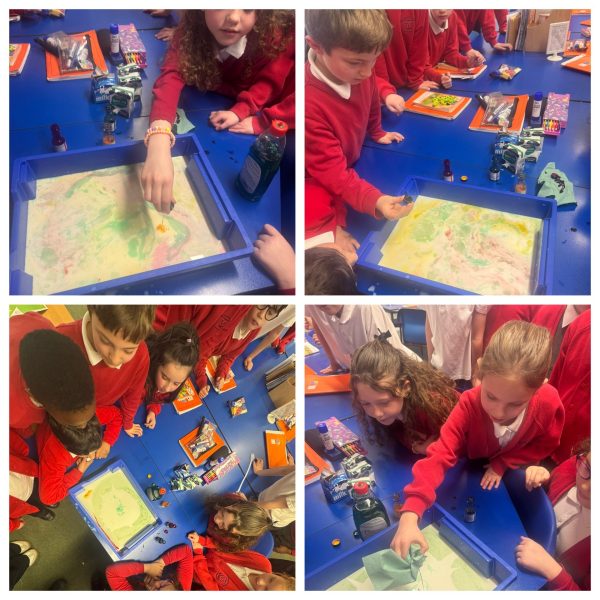
British Science Week 2025 – ‘Change and Adapt’
To celebrate this year’s theme of ‘Change and Adapt’, our whole school got involved in a range of exciting STEM, Science and Reading activities.
-
EYFS explored the world of camouflage through a fun and creative Camouflage Caterpillar activity, learning how animals adapt to blend into their environment.
-
KS1 took part in Amazing Animal Adaptations and Deep Sea Yoga Discovery, discovering how animals survive in extreme environments and combining science with movement to explore marine adaptations.
-
LKS2 engaged with Top of the Crops, learning about selective plant breeding and how humans can influence plant adaptation to improve future harvests.
-
UKS2 investigated water waste and survival skills through Should We Flush It Away? and Be a Desert Island Survivor, exploring the impact of what we flush and how to purify water in emergency scenarios.
The week was filled with curiosity, discovery and lots of hands-on learning as we explored how living things and the environment around us change and adapt.